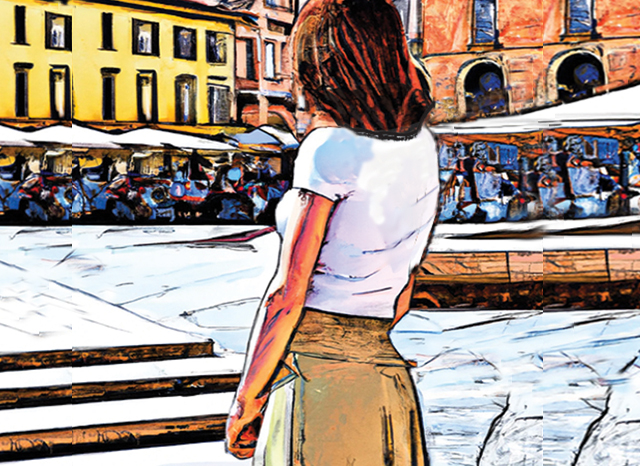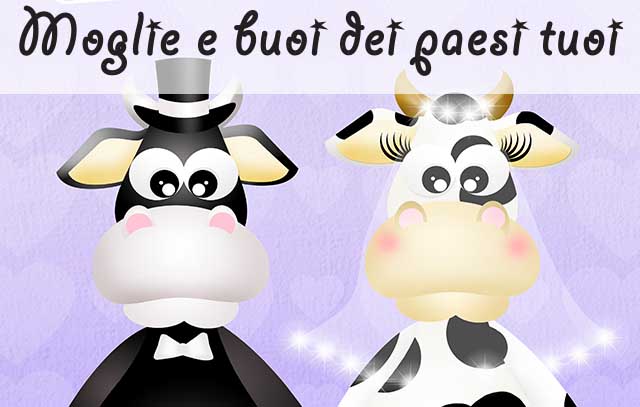
È come guardarsi in uno specchio! Il mondo riflessivo dei verbi reciproci
It’s like looking in a mirror! The reflective world of reflexive and reciprocal verbs
Riconosci i verbi riflessivi?
Can you identify the reflexive verbs?
“Al mattino mi sveglio presto. Preferirei restare a letto e riaddormentarmi, ma sento la voce di mia mamma che mi dice di sbrigarmi. Mi alzo, mi guardo allo specchio per pettinarmi, e poi mi lavo i denti. Prendo il rossetto, mi trucco e mi vesto in fretta. Senza fare colazione, esco di casa per correre alla fermata dell’autobus. Mi fermo lì e saluto i miei amici che mi aspettano e che sono abituati al mio ritardo.”
In the morning, I wake up early. I would prefer to stay in bed and fall asleep again, but I hear my mom’s voice telling me to hurry up. I get up, look at myself in the mirror to comb my hair, and then brush my teeth. I take the lipstick, put on my makeup, and get dressed quickly. Without having breakfast, I leave the house to run to the bus stop. I stop there and greet my friends who are waiting for me and who are used to my being late.

Cosa sono i verbi riflessivi?
What are reflexive verbs?
I verbi riflessivi descrivono un’azione che il soggetto compie su se stesso. L’azione si “riflette” sul soggetto del verbo. Sono verbi transitivi in cui il soggetto e l’oggetto coincidono.
Reflexive verbs describe an action that the subject performs on itself. The action is “reflected” back on the subject. These are transitive verbs where the subject and object are the same.
Come si riconosce un verbo riflessivo?
How can you identify a reflexive verb?
I verbi riflessivi italiani terminano con “-si” nella loro forma all’infinito (es: alzarsi, lavarsi, vestirsi). Questo suffisso indica che l’azione del verbo viene compiuta dal soggetto su se stesso.
Italian reflexive verbs end in “-si” in their infinitive form (e.g., alzarsi, lavarsi, vestirsi). The “-si” indicates that the action is performed by the subject on itself.

Un pronome cambia tutto!
A pronoun changes everything!
Lavare (to wash) → Lavarsi (to wash oneself)
Chiamare (to call) → Chiamarsi (to call oneself)
Common Reflexive Verbs
Addormentarsi = to fall asleep
Alzarsi = to oneself get up
Annoisarsi = to get bored
Asciugarsi = to dry up
Divertirsi = to have fun
Farsi la barba = to shave
Fermarsi = to stop (oneself)
Incontrarsi = to meet
Lavarsi = to wash oneself
Mettersi = to put on (clothes)
Perdersi = to get lost
Pettinarsi = to comb one’s hair
Riposarsi = to rest
Sbrigarsi = to hurry
Sdraiarsi = to lie down
Svegliarsi = to wake up
Truccarsi = to put on make-up
Vestirsi = to get dressed

Come si coniugano i verbi riflessivi?
How are reflexive verbs conjugated?
Reflexive pronouns (mi, ti, si, ci, vi, si) precede
the conjugated verb and agree with the subject. For example:
Mi sveglio presto.
I wake up early.
Ti lavi le mani.
You wash your hands.
Lavarsi (—are verbs)
mi lavo
ti lavi
si lava
ci laviamo
vi lavate
si lavano
Vedersi (—ere verbs)
mi vedo
ti vedi
si vede
ci vediamo
vi vedete
si vedono
Vestirsi (—ire verbs)
mi vesto
ti vesti
si veste
ci vestiamo
vi vestite
si vestono
When used with verbs that proceed the reflexive verb such as “preferire” or with modal verbs, i.e, Potere, Volere and Dovere reflexive pronouns can be attached to infinitives after dropping the final — e.
Preferisco riposarmi dopo lavoro.
I prefer to rest (myself) after work.
Voglio alzarmi presto.
I want to get (myself) up early.
Deve lavarsi le mani.
She must wash her hands.
Potete alzarvi quando la prima donna entra la stanza?
Can you all stand up when the leading lady enters the room?
Cosa succede nei tempi composti?
What happens in compound tenses?
In compound tenses, reflexive and reciprocal verbs are always
conjugated with essere, and the past participle agrees with the subject.
Mi sono svegliato/a tardi.
I woke up late.
Ci siamo incontrati/e ieri.
We met yesterday.
E tu, come ti senti con i verbi riflessivi?
And you, how do you feel about reflexive verbs?
Ora che hai esplorato il mondo riflessivo dei verbi italiani, ti senti più sicuro? Ricorda, la chiave è praticare e divertirti! Prova a scrivere una breve storia usando almeno cinque verbi riflessivi e condividila con un amico o un insegnante. E non dimenticare: ogni errore è un passo in più verso la padronanza della lingua!
Now that you’ve explored the reflective world of Italian verbs, do you feel more confident? Remember, the key is to practice and have fun! Try writing a short story using at least five reflexive verbs and share it with a friend or teacher. And don’t forget: every mistake is one step closer to mastering the language!











“al bar del mare” rather than “al bar al mare”?
Ciao Alex, Ho chiesto un amico e lui dice invece di usare “mare” meglio usare semplicemente “Spiaggia”. In italiano usano spesso la parola “mare” come sinonimo di “spiaggia”: es. La prossima estate andrò al mare (andrò in spiaggia) Ma quando ti riferisci a tutto ciò che sta sulla sabbia, compresi gli edifici come bar, ristoranti o pizzerie, è meglio usare la parola “spiaggia”. Quindi ha senso di dire: Ci eravamo incontrati ogni estate al bar della spiaggia. 🙂